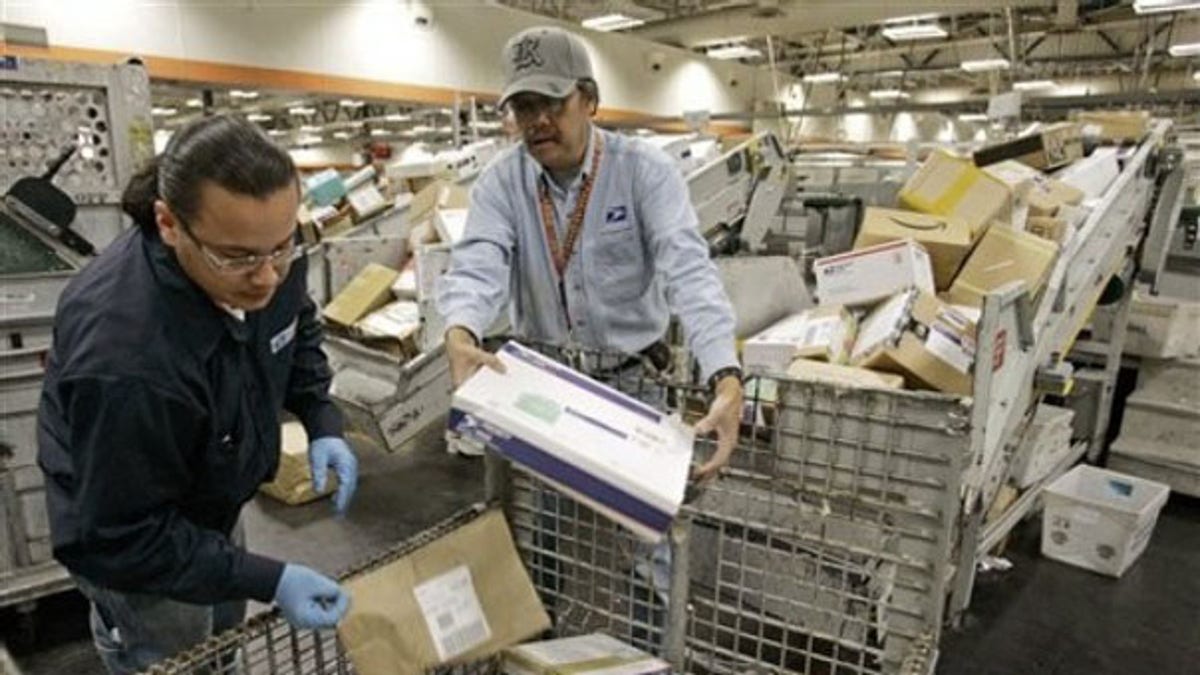
FILE: U.S. Postal Service mail handlers sort packages at the USPS San Francisco center. (AP)
Neither snow nor rain will stop the Postal Service, but fiscal woes ... that's another matter.
A new postmaster general is preparing to take the reins next week at an organization beset by staggering financial losses, union disagreements and an ongoing battle over how to fix itself with regulators and lawmakers.
The change in command comes at a critical time for America's mail service. Outgoing Postmaster General John Potter has warned that the service faces hundreds of billions of dollars in losses over the next 10 years unless big changes are made. When Patrick Donahoe, a postal insider who currently serves as Potter's deputy and chief operating officer, takes over upon Potter's Dec. 3 retirement, he will face an American institution heading toward disarray.
"Pat will have the same problems that Jack has," said William Burrus, former president of the American Postal Workers Union, praising the headway Potter made while hoping for serious reforms in the years ahead.
Donahoe, who was not available for an interview, will face a slew of challenges. Most immediate is a set of contract negotiations with the APWU, a union of 209,000, and with the National Rural Letter Carriers Association, a union of 115,000.
The NRLCA talks hit a wall over the weekend and will now have to be resolved by a third party. The talks with the postal workers union have been extended until Dec. 1. Burrus, who is no longer the lead negotiator for his union, said wages and a policy that protects employees from layoffs after six years of service have been key points of contention.
Aside from the union standoff, Donahoe has a financial mess on his hands. The Postal Service announced earlier this month that it endured $8.5 billion in losses during the last fiscal year. The hit was attributed to the recession, a decline in mail volume and other factors -- even though the organization eliminated more than 100,000 full-time positions. A major part of the problem is that first-class mail, the biggest cash cow for the service, has been declining persistently. And the long-term trends don't look any better. The service projects mail volume will fall from 177 billion in 2009 to 150 billion in 2020, with first-class mail falling from 51 percent to 35 percent by that time. All factors considered, this could mean a $238 billion cumulative shortfall by 2020, according to the Postal Service.
Potter earlier this year outlined a 10-year plan to try to close that shortfall, but he leaves next week after a decade at the helm.
Postal Service spokesman Gerry McKiernan said Donahoe generally supports Potter's plan, though he could "tweak" it when he delivers a report to Congress at a Senate subcommittee hearing set for Dec. 2.
As for the Postal Service's financial woes, McKiernan said, "He's working on it very, very hard."
But balancing the budget at the Postal Service is not as easy as balancing the budget at, say, FedEx.
For instance, the Postal Regulatory Commission recently rejected a proposal to raise the stamp price by two cents. The Postal Service, claiming the rate increase would bring in $2.3 billion in "much-needed revenue" in the first nine months of 2011, has since appealed that decision to the U.S. Court of Appeals in the District of Columbia and filed its brief in the case Tuesday. The case may not be resolved until well into next year.
The Postal Service also is pushing to end Saturday delivery, something the APWU has opposed on the grounds that it would downgrade service dramatically. That proposal is before the Postal Regulatory Commission, which will issue an advisory opinion, but Congress has the authority to make the final call.
Potter has proposed a number of other reforms, but Burrus said Donahoe absolutely needs the help of Congress if he wants to bring the mail service back into the black for the long term. Part of the reason the Postal Service ended up $8.5 billion in the hole last year was because it was required by law to pay $5.5 billion in advance for future retiree health benefits. The APWU cites this annual requirement as a primary driver of the Postal Service's deficits.
Asked why the Postal Service Board of Governors, which tapped Donahoe for the job, didn't reach into the private sector for a new leader, Burrus said the Postal Service needs an insider -- and that Congress "has to help."












































